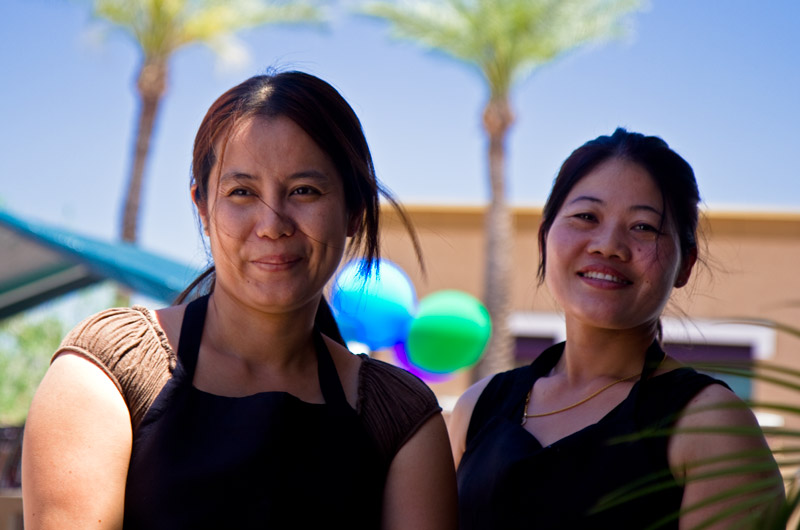
The first half of this year has seen Caroline and I eating frequently, very frequently at Little Rangoon, a Burmese restaurant in Scottsdale, Arizona. During this time it has not been uncommon for me to find myself in the kitchen looking over the shoulder of the cooks trying to learn a thing or two about how they made my meals and what went into them. For the past two weeks, I’ve been to the restaurant every day except Mondays when they are closed. The owner Elizabeth allowed me to come in and write down the recipes. During these visits, I had the chance to learn just a little about the lives of refugees. These two Burmese refugees who worked in the kitchen of Little Rangoon are Yin Min and Mai Yu. The two, while not related, are like sisters now. Escaping absolute poverty from a hostile regime in what is today known as Myanmar, the two lived in a refugee camp in Thailand. Between the United Nations and the U.S. government, these young women were able to escape the refugee camp and come to America. First stop, Phoenix, Arizona.
Neither speaks much English and there is almost no contact with Americans. Some of the neighbors at the apartments they were moved to are other Burmese refugees which gives them a small community they can feel a part of. Their children are learning English but that isn’t helping the parents. In over two years in Phoenix, neither of them have ever left the city, somehow I don’t think they really know-how. Government assistance helps most of the refugees eke out a meager and isolated life. While there are those who would demand they learn our language and integrate themselves with our American way of life, I don’t believe most of us can comprehend what it may have felt like for young women to grow up more or less in a jungle, afraid of a raping and marauding dictatorial military dictatorship where food, any kind of food is a luxury. And then you are transported free of charge on your first-ever flight to a desert city with grocery stores stacked full with 100s of thousands of neon-colored packages with more cars seen in an hour than you may have seen in a month driven by giants who are loud, rotund, and in a hurry. How would this extreme culture shock affect the average human? Well, imagine that you were abducted from your home, stripped of your clothes, given furs and leather clothes before being dropped off in a village of Inuits in the Arctic Circle. Your next meal will be a raw seal, you don’t speak the language, and it’s cold real cold. How quickly would you feel at home?
Our present hostility to cultural differences, our non-participation with things foreign, our disdain for Muslims, Hispanics, and those who don’t speak in our tongue are an embarrassment. When our ancestors came to America they didn’t bother to learn Athabaskan or Hopi, nope, we created Indian schools and kidnapped children off of the reservations that we were imprisoning their parents on and forced them to learn English. Today our compassion has changed little. Every Vietnamese, Burmese, Laotian, Afghani, Guyanese, Nigerian, Mexican, and other people of various ethnic backgrounds who are adding to our population that Caroline and I speak with have loved being asked about their homes, their culture, their food, and their family. It is my good fortune that I enjoy taking the time to introduce myself to these folks who maybe need us to approach them with a kind act of breaking the ice as they try to find their footing in our alien culture.